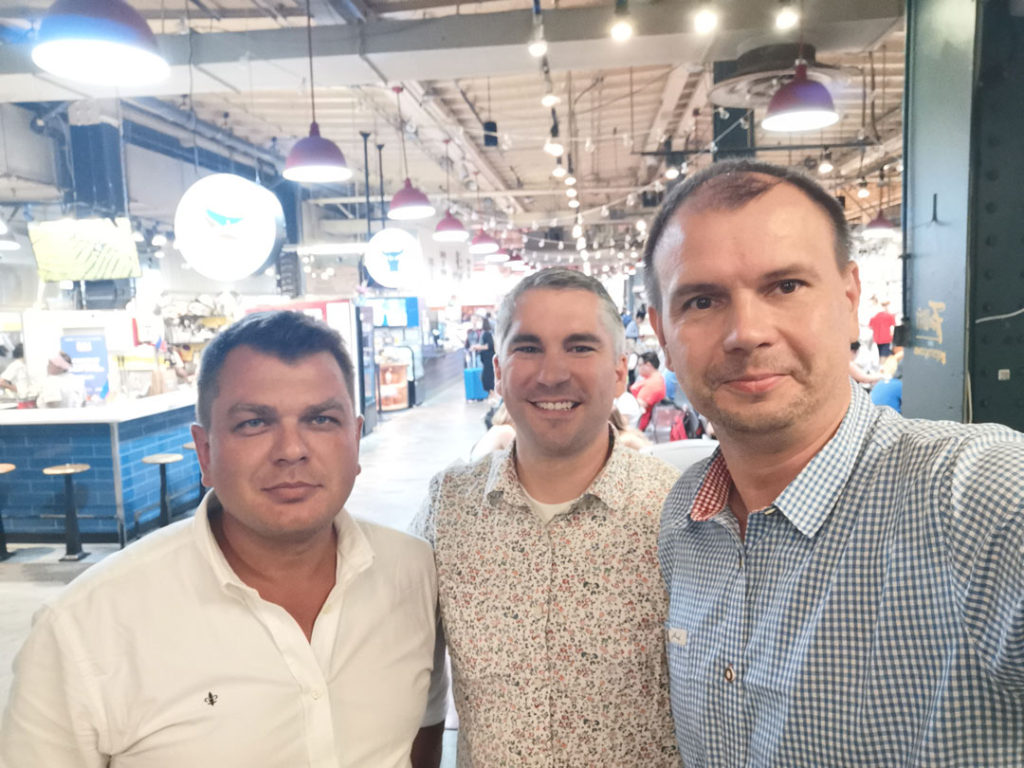Supply chains have faced challenges before, but most startups I know can’t relate to operating in a warzone, something Vanongo, a Ukrainian company with offices in Kiev, is daring to do.
I met Viacheslav (Slava) Levchenko, co-founder of Vanongo through a mentoring set up from WEVE in December 2021 and have watched them continue to persevere and keep to their ambitions of growth despite the difficult circumstances. With an inspirational story to share, I invited Slava to talk about what it’s like to operate a startup in Ukraine, the difficulties that persisted before and during the war as well as what’s to be expected after it.
‘Tough times create great people’
“[…]in really tough conditions, you need to be much more creative” says Slava to help me understand what the startup environment in Ukraine was like historically before the war. With a difficult national history and lack of infrastructure of investment, getting a new business going was no easy feat – at least not as easy as some of the other markets in the US and EU.

Hailing from Kiev, Slava co-founded Vanongo, a B2B SaaS AI-powered delivery orchestration platform with his co-founder Andrey in 2020. The business was incorporated in the EU but was always Ukrainian from the start.
Slava and Andrey were like many other Ukrainian founders looking to establish themselves and eyeing an ambitious expansion – typical for a company based in a country where solutions have to be more pragmatic, with the potential for global scale, and better unit economics from Day 1.
Building scalable business models with supporting infrastructures, a challenge the country’s talented engineering and IT professionals have tackled countless times, are shown in the success of Ukraine unicorns such as Grammarly, Ring, GitLab, Looksery, Genesis, and others. Vanongo held a similar ambition, finding clients in Poland, Romania, Germany, the UK and eventually, the US.
After winning the Google for Startups Ukraine Support Fund competitions, the team received a $100,000 grant that boosted the resolve to keep growing, leading the company to later develop an API that integrates with Google to disrupt the last-mile market.
“I wouldn’t say we were completely relaxed”

I met Slava and the Vanongo team in December 2021 as their mentor through the WEVE accelerator program that helps foreign startups understand and expand into the US.
Through December and January (and even a few days prior to the invasion) I sensed that Slava was less concerned about a potential invasion even as the media in the US made me feel more worried on his behalf. I remember Slava telling me that they’d been in a de facto state of war since 2014 and they were relatively used to living on the edge of conflict, but as Slava explained “it’s difficult for the brain to be constantly in a state of stress”. And so he put on a smile and continued to press onward for himself and his team, while always remembering to have a full tank of gas and an emergency bag in the trunk of his car.
“I was in Kiev, and I didn’t hear the noise of the first missiles… It was a shock”
Slava remembers the morning of the invasion and hearing the news of the missile strikes from Andrey, who was in Munich at the time and following the news. “We were fully disoriented. I tried to understand what to do, whether to leave Kiev or not”, says Slava as he tried to grapple with the unthinkable. He decided to relocate to the western part of Ukraine while his wife and two kids fled to Poland. He remembers a full two weeks of silence with his team and says “we were fully disoriented, we took care to help people, some tickets, some coordination of the information”. Some of his team were in Kharkiv, which was under heavy fire in those days, and he tried to help with whatever they needed, “Everyone! How can we help? with money? with some apartments?, etc?” he remembers asking.
Only after everyone was verified and somewhat settled could Slava and his team think about what to do next with the business. Luckily, part of Vanongo’s operations were in Kazakhstan, so the business could continue running to some extent but not all startups had the same fate: “I know startups that had lost almost all traction in Ukraine. So they closed their business… they simply didn’t survive.”
“How we can help our people, how can we support Ukrainians”
As a startup that began with the initial idea of creating a B2B Uber-like service for brands to streamline order deliveries, Vanongo eventually turned into a B2B service that made it easy for businesses to improve their unit economics by collaborating with one another. A company that owns its own trucks can use Vanongo to tack on other vendor’s deliveries that are on the already scheduled route – providing all incremental revenue.
Slava remembers the realization that although his software couldn’t move tanks, there were a lot of things he could help move. “We focused our efforts on humanitarian goods”, as he tries to remember who coined the idea that logistics can help win wars. “We dedicated part of the team to coordinate the drivers, to find drivers, to find people outside of Ukraine who can bring some goods.
[It was] a wide range of goods… in really hot spots. It was Dnipro, Kharkiv, Kherson cities. There was a war, there were firefights.”
With Slava in Kiev and other teams operating remotely from Kazakhstan, Vanongo devised strategies and developed systems to facilitate logistics for food and other goods for humanitarian aid in the warzone.
“There was a situation when we had to deliver from the US to Spain, from Spain to Poland, from Poland to the border. After the border to Lviv, from Lviv to Kiev, from Kiev to Kharkiv, and each part was a new equation.”
“Our carriers and drivers, they’re really brave people” says Slava about those who were determined enough to make the journey into hot zones, to establish routes and oversee fulfillment.
In May, the Ukrainian government was able to take over critical humanitarian missions to places like Kharkiv and Kherson, but it was because of companies like Vanongo that critical goods moved into the hardest warzones to help ease suffering in those early days, “So these two months, we were really needed for the country, for the people.”
He recognizes the impact his business had on his fellow countrymen and explains that in Ukraine there is a deeply rooted culture of fighting against problems, so naturally he and his team stepped up to help in any way they could during a critical and stressful situation.
When asked about specific stories or memories of running the humanitarian logistics network in the hot zones, Slava recounted some of the recognition his company received, such as diplomas from local authorities and spoke of mutual gratitude shared between the people.
He also spoke of how they found brave women cooking for soldiers on the front lines, an effort equally important and effective as any other attempt made by any Ukrainian against the invading forces.
“It’s the result of the current situation when we are fighting with a huge army and we are, I think, winning this war. We’ll win this war. It’s because almost everyone in Ukraine participated in this war so the functions are different. Some can do more, some less, but it’s 40 million people. It’s not just an army or just some government. It’s a matter of people.”
Lessons for Startups
“Everyone tried to do something because in this critical, stressful situation, you need to do something, otherwise it’s crazy. It’s difficult to live in this environment. And when you are doing something, when you are making some impact by helping other people in a critical situation, it’s just easier for you.”
While the conflict rages on, Ukrainian businesses continue to operate and struggle to provide for themselves as well as their country. Examples such as Vanongo are proof that persistent struggle and envisioning a brighter future is the only way to traverse the darkest of times.
Resilience was achieved by acknowledging the destruction and helping others rebuild themselves. There’s much to be learned from Vanongo’s story whether you’re starting a business or struggling with one already.
“Startup founders, they usually pass a lot of crises, especially serial founders who are building their second, third startup. And in our situation when we were this first month of full stress, shock, & frustration, the recipe was quite simple. Just keep going. Just keep the ball rolling and continue to do small stuff every day.”
Highlighting the importance of a company’s vision, mission and its product, Slava says, “I think that’s important when you really believe that your product has some purpose. It helps you to pass difficulties.”
Another important piece of advice by Slava is to support people. Talking about how he and everyone he knew managed to get through the dark times, Slava says, “I don’t know how to explain it, but yeah, you support each other and it gives you the power to move forward because when you are alone, it’s really difficult.”
He also emphasized the importance of having a purpose that goes beyond making money, and how that helped his team persevere through the suffering. The purpose, vision, and the mission of his company changed over time as they learned more about their product and its value to customers.
“You would like to change the world, but when you believe that your product, your business are doing something truly important not only for your pocket, but for people, that really helps you not to give up.”
“It’s always easier to give up when it’s a matter of you only, but when you believe that you can help others, you can change something for the better. That gives you some more strength to move forward. “
As they face more challenges ahead, this resilience will inevitably help them persevere. While our hearts, prayers and support go out to Slava and the people of Ukraine, we must all look at the challenges we face with a sense of coming up with solutions that benefit everyone.
A hope for a Post-War Ukraine
Even after a year of devastating destruction and loss of life, Slava said that in Ukraine, there’s a shared cultural spirit for fighting against tough adversities and finding solutions to problems. And the war was no different. It’s a really tough situation but it demands everyone to do something.
However unimaginably difficult the circumstances may seem, Slava typifies a distinctly Ukrainian resolve and unwavering determination to make it through. The pre-war efforts for development of supporting infrastructure for startups and businesses in Ukraine will speed up.
There’s a silver lining here and Slava thinks that because most of the workforce is already settled or trying to settle abroad, they’re going to work to bring global aid back to Ukraine. Slava hopes Ukrainian startups will eventually have greater access to funding and an easier path for expansion to other markets.
With an increased attention towards rooting out corruption and malpractices via better legislation, the Ukrainian government aims to stabilize the business sector to support startups.
Expressing his wish for a population envisioning global expansion with each project they undertake, Slava says: “Ukrainians, historically, we love freedom and freedom, on one hand, it’s good for entrepreneurs…But for startups, that’s a mindset. We love this feeling of freedom that we can disrupt current rules.”






2 thoughts on “Running a Startup in a Warzone: How Ukrainians adapted and grew in the early days of the war and what founders can learn from it”
Favorite quote….. It’s always easier to give up when it’s a matter of you only, but when you believe that you can help others, you can change something for the better. That gives you some more strength to move forward. “
Words to live by.
Pingback: Space Logistics: The Next Frontier in Global Supply Chain - izba